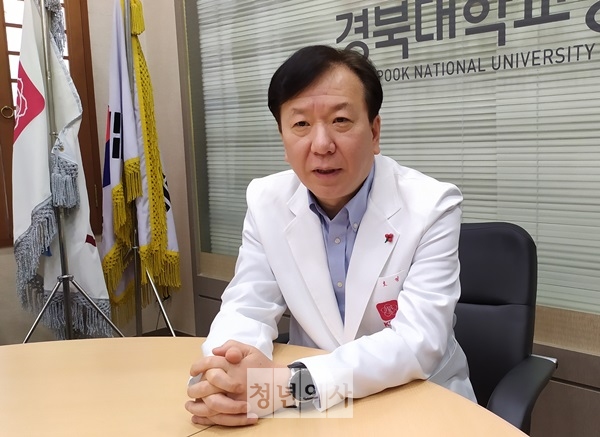Chung Ho-young, nominated to head the Ministry of Health and Welfare by President-elect Yoon Suk-yeol, has come under fire for various suspicions, emerging as a “major target” by the political opposition.
Chung, former president of the Kyungbuk National University Hospital (KNUH), is denying all allegations regarding him, including his two children’s transfers to the medical college he headed, lack of expertise in welfare issues, and the concurrent serving as the head of community credit cooperative within the hospital.

Chung makes it clear he has no intention of voluntary resignation, heralding an uphill struggle in the confirmation hearing at the National Assembly.
Suspicions about Chung began from his columns contributed to a local paper about a decade ago. Criticizing the amendment to the Children and Adolescent Sex Protection Act in 2013, Chung sarcastically said that doctors would need a “three-meter-long stethoscope” not to be suspected of being sexual offenders.
In another column, he also blamed single women for pulling down the nation’s birthrate while alleging that marriage and childbirth are “patriotic acts.”
The ruling Democratic Party of Korea (DPK) lawmakers belonging to the National Assembly’s Health and Welfare Committee called for Chung’s voluntary resignation. “We cannot repress our astonishment at the nominee’s perception regarding sexual harassment and women’s childbirth issues as ‘peanuts to kill time.’”
Concerning his children’s transfers to the Kyunbuk University School of Medicine, Chung explained that they took due and proper courses. However, suspicions kept growing as it became known later that the university introduced a special admission screening in 2018 when Chung’s son moved to it. Also, both of his children did volunteer activities at KNUH, a requirement for better grades.
Experts point out that although experienced in health issues as a medical doctor, Chung lacks expertise in welfare affairs.
However, Chung seemed to be more than ready to take up the job.
“What’s more important than anything else right now is to improve the medical and quarantine system to restore normalcy, which seems to be the reason for my nomination,” Chung said. “Aside from health and medical affairs, I will listen to the opinions of various experts in matters of welfare and try to find the most reasonable plan to improve the current situation.”
However, Chung faces rough sailing in the parliament’s confirmation hearing.
Rep. Min Hyung-bae, a DPK lawmaker who heads his party’s task force for confirmation hearings, picked Chung as “one of the three problematic nominees.”
Not all are critical of the nominee to head the government’s health and welfare administration.
Some officials in the ministry positively evaluated the nominee, pointing out that Chung showed an “attentive attitude” in studying welfare matters.
A right-wing medical group supported Chung's “statement of conviction,” citing the “three-meter stethoscope” remark.
“Chung’s remark was courageous and honest, properly informing the reality of medical care,” said the National Union of Korean Medical Doctors, a voluntary association of right-wing physicians.
However, political and medical observers said that Yoon’s nomination of Chung reflects the president-elect’s small talent pool, asking how Chung’s only credential should be that “he knows the next president for four decades.”

